

A Simple, Effective Homework Plan For Teachers: Part 1. Dealing with homework can be the source of great stress for teachers; it’s a rare week that I don’t receive at least one email asking for advice.
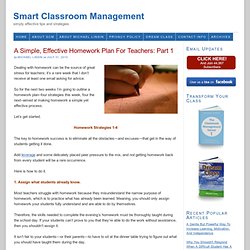
So for the next two weeks I’m going to outline a homework plan–four strategies this week, four the next–aimed at making homework a simple yet effective process. Let’s get started. Homework Strategies 1-4 The key to homework success is to eliminate all the obstacles—and excuses—that get in the way of students getting it done. Super Study Strategies for the Foreign Language Student. Enseigner le lexique. The French Corner: French Books. If you're interested in reading about France without feeling like you're reading a textbook, there are a number of travel essays and other books written about France.
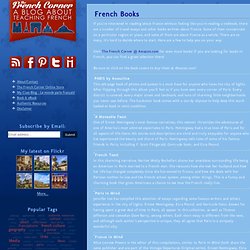
Some of them concentrate on a particular region or place, and some of them are about France as a whole. There are so many, it's hard to decide where to start. Here are a few to help you on your way. Visit The French Corner @ Amazon.com for even more books! Les sites didactiques de FLE. Foreign Language Teaching Methods. About the Site Foreign Language Teaching Methods focuses on 12 different aspects of language teaching, each taught by a different expert instructor.
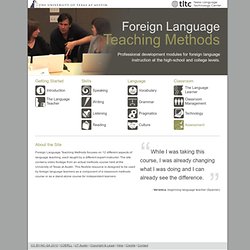
The site contains video footage from an actual methods course held at the University of Texas at Austin. This flexible resource is designed to be used by foreign language teachers as a component of a classroom methods course or as a stand-alone course for independent learners. The Teacher’s Survival Kit for Lesson Planning! Tips & 1000s of Free Lesson Plans. Posted by Shelly Terrell on Saturday, August 18th 2012 Goal 16: Plan An Engaging Lesson of The 30 Goals Challenge for Educators.
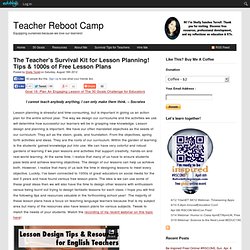
Le français « France Bienvenue. Personal Learning Networks. What is an Unconference? By Jason Bedell, on September 28th, 2010 This is the twenty three post in the Professional Development 2.0 series.
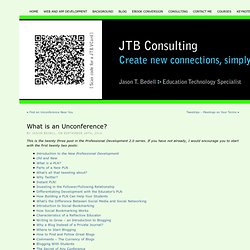
Google Announces 100 Live Hangouts For Teachers Around The World. Track Hurricane Sandy Using The Google Crisis Map 1.05K Views 0 Likes If you're on the east coast like we are, you've got a pit in your stomach about Hurricane Sandy. Inside My Global Classroom. You might have realised that I don’t come from around these parts.
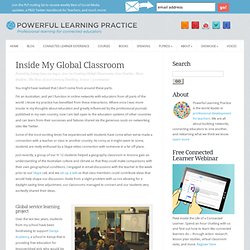
Dessiner une carte heuristique. - Upgrade your KWL Chart to th 21st Century. 0 Comments July 22, 2011 By: Silvia Tolisano Jul 22 Written by: 7/22/2011 12:39 AM.
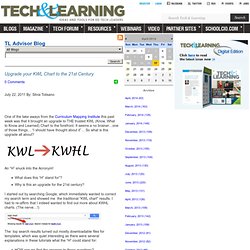
Differentiation Daily. ePortfolios Breakout 4. French Unit Plans. Back To School Lesson Plans, First Day of School Lesson Plans, Beginning Of School Lesson Plans, Teacher Resources, teaching resources, theme, unit, educator, education resources, resource, printables, worksheets. Back to School Activities. The Back-to-School seasonal pages will provide you with great resources to help you get your year started off right.

Ideas within the back-to-school pages include: "get to know you" and ice-breaker, assembly ideas, first day lessons, and bulletin board ideas. Your creativity can help other teachers. Submit your Back to School activity today. Don't forget to include additional resources-documents, web sites, or a photo. This indicates resources located on The Teacher's Corner. Student Contact Card All Grades Here is a great form to use at the beginning of the school year to gather information regarding your students. Word Search Maker Idea: Use our word search maker and use student names as the words.
Also see our other Lesson Plans, Thematic Units and Activities. Portfolios. How Does Project-Based Learning Work? Tools for understanding the process of planning and building projects.

Project-based learning, as with all lessons, requires much preparation and planning. It begins with an idea and an essential question. When you are designing the project and the essential question that will launch the activities, it is important to remember that many content standards will be addressed. With these standards in mind, devise a plan that will integrate as many subjects as possible into the project. Multipotentiality: multiple talents, multiple challenges. One of the myths of highly talented people is they can choose whatever personal and career paths they want, and realize their abilities without hindrance.
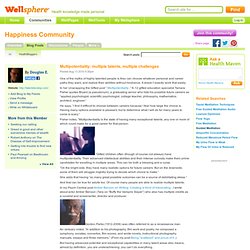
It doesn’t exactly work that easily. In her Unwrapping the Gifted post “ Multipotentiality ,” K-12 gifted education specialist Tamara Fisher quotes Bryant (a pseudonym), a graduating senior who lists his possible future careers as “applied psychologist, scientific psychologist, college teacher, philosophy, mathematics, architect, engineer.” He says, “I find it difficult to choose between careers because I fear how large the choice is. Howard Gardner, multiple intelligences and education. Howard Gardner, multiple intelligences and education. Howard Gardner’s work around multiple intelligences has had a profound impact on thinking and practice in education – especially in the United States. Gardner's Multiple Intelligences.
Critical Thinking: A Path to College and Career. Multiple Intelligences Test and Learning Styles Information. Emotional Intelligence Test. This is an interactive version of the Personality-Based Emotional Intelligence Test. Introduction: The term Emotional Intelligence has been given many specific definitions since it gained popularity in the 1980s, but has is generally taken as theorized aspects of intelligence that that are not general intelligence but instead specific to people, such as understanding other peoples perspectives.
Multiple Intelligences by Dr. Thomas Armstrong. Multiple Intelligences The theory of multiple intelligences was developed in 1983 by Dr. Howard Gardner, professor of education at Harvard University.